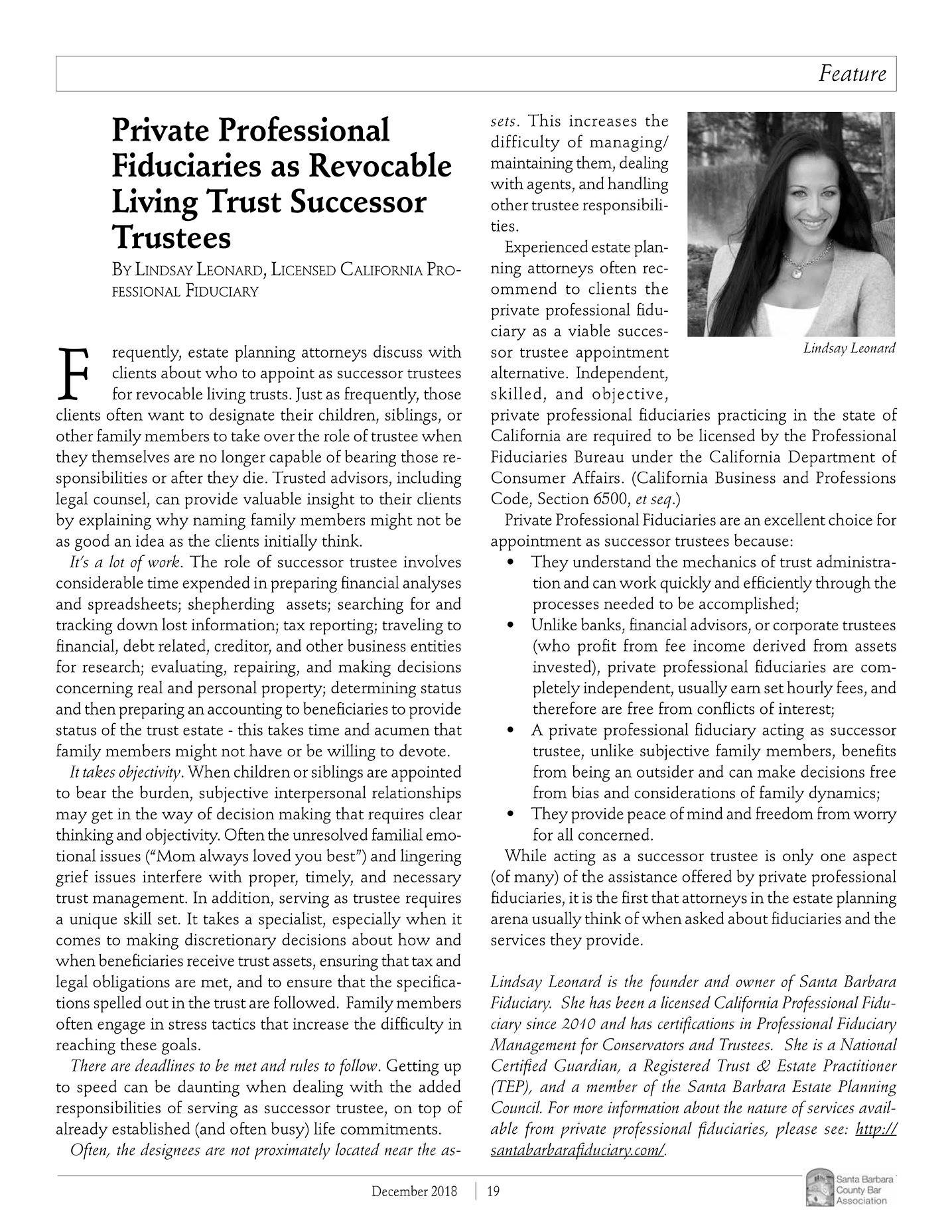Santa Barbara, CA (Santa Barbara Lawyer Magazine) December 2018 —
Private Professional Fiduciaries as Revocable Living Trust Successor Trustees
Frequently estate plan lawyers engage in discussions with clients about who to appoint as successor trustees for revocable living trusts. Just as frequently, those clients often want to designate their children, siblings or other family members to take over the role of trustee when they themselves are no longer capable of bearing those responsibilities or after they die. Trusted advisors, including legal counsel, can provide valuable insight to their clients by explaining why naming family members might not be as good an idea as the clients initially think.
It’s a lot of work: The role of successor trustee involves considerable time expended in preparation of financial analyses and spreadsheets; shepherding of assets; searching for and tracking down lost information; tax reporting; traveling to financial, debt related, creditor and other business entities for research; evaluating, repairing and making decisions concerning real and personal property; determining status and then preparing an accounting to beneficiaries to provide status of the trust estate – this takes time and acumen that family members might not have or be willing to devote;
It takes objectivity: When children or siblings are appointed to bear the burden, subjective interpersonal relationships may get in the way of decision making that requires clear thinking and objectivity. Often the unresolved familial emotional issues (“Mom always loved you best”) and lingering grief issues interfere with proper, timely and necessary trust management. In addition, serving as trustee requires a unique skill set. It takes a specialist, especially when it comes to making discretionary decisions about how and when beneficiaries receive trust assets, ensuring that tax and legal obligations are met and to ensure that the specifications spelled out in the trust are followed. Family members often engage in stress tactics that increase the difficulty in reaching these goals.
There are deadlines to be met and rules to follow: Getting up to speed can be daunting when dealing with the added responsibilities of serving as successor trustee, on top of already established (and often busy) life commitments.
Many times the designees are not proximately located near the assets: This increases the difficulty of managing/maintaining them, dealing with agents and handling other trustee responsibilities.
A beneficial tool which experienced estate plan lawyers are more often recommending to clients as a viable successor trustee appointment alternative is the private professional fiduciary (“PPF”). Independent, skilled and objective, private professional fiduciaries practicing in the state of California are required to be licensed by the Professional Fiduciaries Bureau under the California Department of Consumer Affairs. (California Business and Professions Code, Section 6500, et seq.)
Private Professional Fiduciaries are an excellent choice for appointment as successor trustees because:
- They understand the mechanics of trust administration and are able to work quickly and efficiently through the processes needed to be accomplished;
- Unlike banks, financial advisors or corporate trustees (who profit from fee income derived from assets invested), private professional fiduciaries are completely independent, usually earn set hourly fees and therefore are free from conflicts of interest;
- A private professional fiduciary acting as successor trustee, unlike subjective family members, benefits from being an outsider and is able to make decisions free from bias and considerations of family dynamics;
- They provide peace of mind and freedom from worry for all concerned.
While acting as a successor trustee is only one aspect (of many) of the assistance offered by private professional fiduciaries, it is the first that attorneys in the estate planning arena usually think of when asked about fiduciaries and the services they provide.
For more information about the nature of services available from private professional fiduciaries, and how to protect your clients by using their services, you are invited to peruse Santa Barbara Fiduciary’s website at: http://santabarbarafiduciary.com/
In addition, the California Dept. of Consumer Affairs has information about private professional fiduciaries at: https://thedcapage.blog/2016/01/13/what-is-a-professional-fiduciary/
And the California Professional Fiduciary Association’s website may be accessed at: https://pfac-pro.org/find-a-fiduciary/role-of-a-fiduciary/
Lindsay Leonard is a graduate of the University of California Santa Barbara where she earned a degree in Biological Sciences with an emphasis in molecular, cellular and developmental biology. She has work experience in research and development of next generation antibody therapeutics and of novel immunotherapies for the treatment of cancer and in two, well known asset management firms in the Santa Barbara area as a junior analyst.
Lindsay has been a licensed California Professional Fiduciary since 2010 and has certifications in Professional Fiduciary Management for Conservators and Trustees. She is a National Certified Guardian, a Registered Trust & Estate Practitioner (TEP), and member of the Santa Barbara Estate Planning Council.










